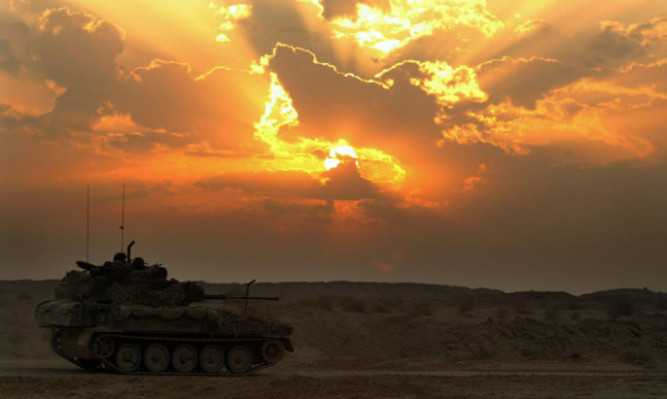Nearly three-quarters of people think we were wrong to invade Iraq and more than four out of five say it was not worth the cost in lives or money, a survey commissioned by The Courier has found.
The Courier begins a four-day series on Tuesday, marking the 10th anniversary of the invasion of Iraq.
We will tell the story of the war from the eyes of servicemen and women in your area, those who were injured physically and mentally, and the Iraqis themselves.
We will also commemorate the brave men and women who lost their lives.
The Courier Iraq War Survey, carried out by polling group Your View K, asked 397 people a series of questions about the war.
Almost three-quarters (73%) did not believe British troops should have been part of the invasion. Virtually the same proportion (72%) said we were not justified in invading Iraq.
Only 8% thought Britain is safer because we toppled Saddam Hussein and an overwhelming 84% said the war was not worth the cost, in both lives and money.
Just under a third of those polled were Courier readers and their views closely matched the overall results.
Few respondents believed that weapons of mass destruction were the driving force behind the war, with most saying economic stability and toppling Saddam were the real reasons.
Our survey also showed that 51% think Iraq is better off now but almost a third remain unconvinced.
More than 100 respondents left overwhelmingly negative comments.
An unnecessary loss of life, “lies” about weapons of mass destruction, poor post-invasion planning and the extended duration of the war were the main issues raised.
Dozens called for Tony Blair and George W Bush to be tried as war criminals.
Angus Robertson, from Broughty Ferry, said: “No forethought was given to after the fighting very short sighted and the people of Iraq are still paying.”
“It was illegal, unnecessary and destroyed the credibility and reputation of potentially the best PM the UK would have seen in the 20th century,” said Colin Pavey, Banchory.
Peter Whyte. Kirkcaldy. was one of only a handful who defended the war. He said: “Decisions are made on the information known or expected. Looking at events retrospectively is easy and there are always people who are happy to point the finger normally by those who haven’t a clue.”
Iraq War 10-Year Anniversary see the first part of our special series in Tuesday’s Courier
